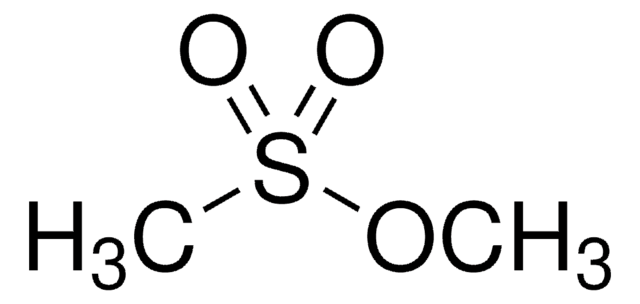178934
Boron trichloride solution
1.0 M in methylene chloride
Synonym(s):
Boron chloride, Trichloroborane
About This Item
Recommended Products
vapor pressure
29.72 psi ( 55 °C)
9.05 psi ( 20 °C)
Quality Level
form
liquid
reaction suitability
core: boron
reagent type: Lewis acid
reagent type: catalyst
concentration
1.0 M in methylene chloride
density
1.326 g/mL at 25 °C
storage temp.
2-8°C
SMILES string
ClB(Cl)Cl
InChI
1S/BCl3/c2-1(3)4
InChI key
FAQYAMRNWDIXMY-UHFFFAOYSA-N
Looking for similar products? Visit Product Comparison Guide
Related Categories
General description
Boron trichloride solution is used as a Lewis acid catalyst in the synthesis of BN-phenanthrenes.
Application
Packaging
Legal Information
Signal Word
Danger
Hazard Statements
Precautionary Statements
Hazard Classifications
Acute Tox. 3 Inhalation - Acute Tox. 3 Oral - Carc. 2 - Eye Dam. 1 - Repr. 1B - Skin Corr. 1B - STOT SE 3
Target Organs
Central nervous system
Storage Class Code
6.1A - Combustible acute toxic Cat. 1 and 2 / very toxic hazardous materials
WGK
WGK 3
Flash Point(F)
Not applicable
Flash Point(C)
Not applicable
Personal Protective Equipment
Regulatory Listings
Regulatory Listings are mainly provided for chemical products. Only limited information can be provided here for non-chemical products. No entry means none of the components are listed. It is the user’s obligation to ensure the safe and legal use of the product.
PDSCL
Poisonous substance
PRTR
Class I Designated Chemical Substances
ISHL Indicated Name
Substances Subject to be Indicated Names
ISHL Notified Names
Substances Subject to be Notified Names
JAN Code
178934-BULK:
178934-100ML:4548173110042
178934-25ML:
178934-PZ:
178934-2L:4548173360584
178934-4X10ML:
178934-VAR:
178934-1L:
178934-4X25ML:4548173309132
178934-800ML:4548173110059
Choose from one of the most recent versions:
Already Own This Product?
Find documentation for the products that you have recently purchased in the Document Library.
Customers Also Viewed
Global Trade Item Number
| SKU | GTIN |
|---|---|
| 178934-100ML | 4061838754035 |
| 178934-800ML | 4061838754066 |
| 178934-25ML | 4061838083890 |
| 178934-2L | 4061838754042 |
| 178934-4X10ML | |
| 178934-4X25ML | 4061838754059 |
Our team of scientists has experience in all areas of research including Life Science, Material Science, Chemical Synthesis, Chromatography, Analytical and many others.
Contact Technical Service





